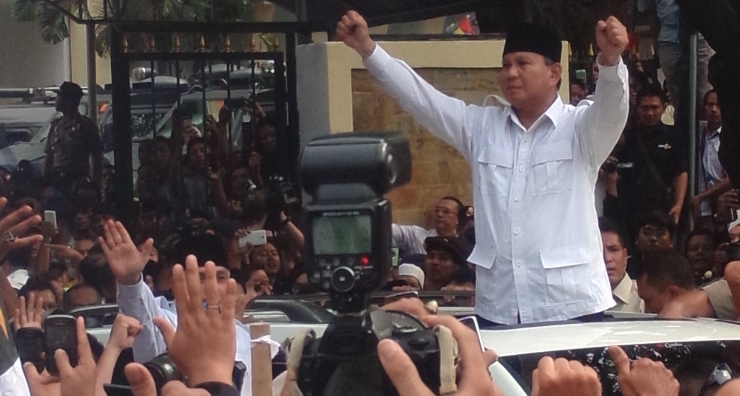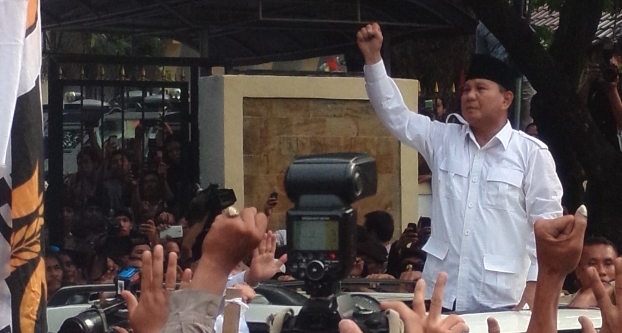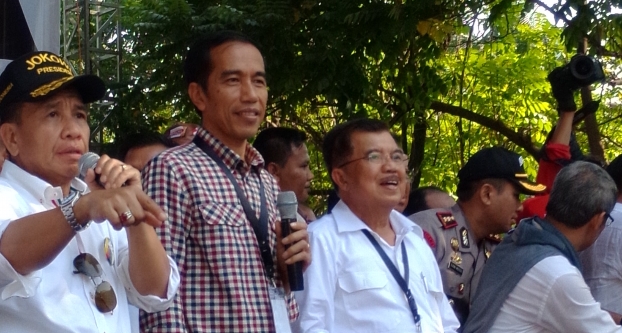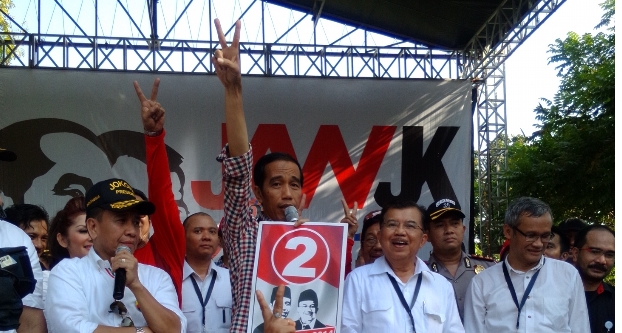Driving commercial and political engagement between Asia, the Middle East and Europe
Driving commercial and political engagement between Asia, the Middle East and Europe
Driving commercial and political engagement between Asia, the Middle East and Europe

Indonesia is going to hold its second direct presidential election today.
There are two competing pairs in the 9 July 2014 election.
The first pair is Prabowo Subianto – Hatta Rajasa. Prabowo is a former Indonesian military general and the son of Dr. Soemitro Djojohadikusumo, one of Indonesia’s most prominent economists. He is also the former husband of Siti Hediati Harijadi, universally known as Titiek, the second daughter of Indonesia’s notorious authoritarian leader Suharto. The couple are now divorced, but have a son, Didit Hediprasetyo. Prabowo’s partner Hatta Rajasa is the former Coordinating Minister for Economic Affairs in the current administration.
The second pair is Joko Widodo (known as Jokowi) – Muhammad Jusuf Kalla (JK). Jokowi is the (now officially inactive) Governor of Jakarta, while JK is a former vice-president of Indonesia who served in the first term of the administration of outgoing President Susilo Bambang Yudhoyono.
Unlike previous elections, this election will be a single-round election because there are only two contestants who are competing to lead Indonesia for the next five years.
The first pair has the support of five political parties that cumulatively won 48.93 percent of the total votes (292 seats) in the People’s Representative Council (Indonesia’s lower house of parliament) in the April legislative elections. On the other hand, the second pair, Jokowi-JK, is supported by four political parties which secured 39.97 percent of the total votes (207 parliamentary seats) in the same elections.
Nevertheless, in Indonesia’s direct presidential election, there is no guarantee that the pair with the largest party coalition behind them will win the election. Indonesian voters tend to have a low level of loyalty towards political parties and give more attention to candidates’ personal traits.
Thus at the time of writing both pairs have a relatively equal opportunity of winning the election.
The electorate, particularly the middle-educated classes, will also consider their vision, mission and proposed policies.
The personal traits of both candidates
Regarding personal traits, both candidates project a very different image to the electorate. Prabowo is viewed as a strong, decisive and heroic leader. His track record as a former military general supports his attempt to create this image. Indeed as Suharto’s son-in-law, his career in the military enjoyed a meteoric rise.

Prabowo Subianto, a former military general, campaigns to be Indonesia’s next president. Photo by Yoes C. Kenawas
He was one of the Army field officers when Indonesia occupied Timor-Leste. He was then promoted to being commander of the Indonesia’s special forces Kopassus. Finally, he got promoted to Commander of the Army Strategic Reserve Command.
Prabowo resigned from the military in 1998 due to an allegation that his subordinates had abducted pro-democratic student activists, but this allegation has not been proved. He then moved to Jordan to build his business empire from there.
Currently, Prabowo is Chief Patron of the Great Indonesia Movement Party (Gerindra), a political party in Indonesia.
His running mate Hatta Rajasa is viewed as a seasoned politician and an experienced bureaucrat. He had served in various ministerial posts during the Megawati and Yudhoyono administration. He is the mastermind of Yudhoyono’s economic policies, known as ‘Hattanomics‘ (based on protectionism, export limits, export bans and restrictions on foreign ownership.)
Hatta is also chairman of The National Mandate Party, a post-New Order (ie post Suharto-era) moderate Islamist political party in Indonesia.
In the other camp, the general public views Jokowi as a humble, honest and action-oriented leader with good managerial skills. Additionally, he is also viewed as a new face in the post-Suharto Indonesian politics. Jokowi started his political career as the Mayor of Surakarta, often called Solo, a small city in Central Java. Prior to his career as Mayor, Jokowi was a successful furniture businessman in Surakarta. After two terms of a successful career as Mayor, he ran for Jakarta governorship in the 2012 Jakarta gubernatorial election and defeated the incumbent Jakarta Governor Fauzi Bowo.
Jokowi does not hold any structural position within his party, the Indonesian Democratic Party of Struggle (PDIP).
Therefore, when the party’s chairwoman and leader Megawati Sukarnoputri, the eldest daughter of the late Sukarno (the first president of Indonesia), nominated him as the presidential candidate, the Indonesian public lauded the decision as a breakthrough in Indonesia’s political scene because the customary practice in the country was to nominate the party leader as a presidential candidate.

President hopeful Joko Widodo. Photo by Yoes C. Kenawas
Jusuf Kalla is a veteran politican who was vice-president during the first term of the incumbent President Susilo Bambang Yudhoyono of 2004-2009.
He is famous as a peacemaker, solution-oriented leader and a successful businessman. Kalla was able to reach the peace deal with the Aceh Freedom Movement (known as GAM in Indonesian), a separatist group that was seeking independence for the Aceh region. He also played an important role in resolving some communal conflicts in Poso (Central Sulawesi), in Moluccas and other regions.
He was the architect of converting Indonesia’s household cooking fuels from kerosene to liquid petroleum gas (LPG). However he was defeated by Yudhoyono in the 2009 presidential election. He was then appointed as the Chairman of the Indonesian Red Cross (known as PMI in Indonesian) and coordinated prompt responses to some regions in Indonesia that were struck by various natural disasters.
A survey by Indikator Politik Indonesia published in May 2014 suggested that Jokowi is perceived as a leader who is honest and trustworthy, people-oriented and who has good leadership skills (See Indikator, 2014). On the other side, Prabowo is viewed as a decisive and authoritative leader.
The May 2014 Indikator survey indicated that Jokowi-JK was leading with 51 percent of the total respondents, compared to Prabowo-Hatta with 32.4 percent of the total support. However, the Prabowo-Hatta pair still had plenty of chance to close the gap, particularly because they are supported by a number of Indonesian tycoons such as Aburizal Bakrie, former chairman of the Bakrie Group and entrepreneur Hasjim Djojohadikusumo, Prabowo’s younger brother, all of whom can provide enormous funds to their campaign.
Policy outlook
Both candidates claim that their policies will be nationalist, pro-poor and promoting good governance principles. However, despite their nationalist and pro-poor rhetoric, both candidates also claim that they are pro-growth and intend to create an investment-friendly climate. Both candidate guarantee that there will be no attempt to nationalise foreign companies in Indonesia. Nevertheless, both candidates intend to strengthen the government’s bargaining position when they have to deal with foreign companies in Indonesia, particularly when related to Indonesia’s natural resources.
The main difference between the two is that Prabowo-Hatta seems keen on promoting a continuation of Yudhoyono’s development policies. For instance, the duo have pledged to continue Yudhoyono’s initiative to accelerate economic development through the Indonesia Economic Masterplan 2011-2025 (MP3EI).
That is not surprising because the mastermind behind the MP3EI was Hatta Rajasa. The pair also want to implement some policies to give added-value to Indonesia’s natural resources. That resonates with the current government policy on banning the exports of raw ore, which was promoted by Hatta Rajasa when he was the Coordinating Minister for Economic Affairs.
On the other hand, Jokowi-JK offers fresh approaches to accelerate Indonesia’s development. The Jokowi-JK pair want to reduce the logistic costs across the archipelago by building new roads, double-track railroads, airports, and deep seaports with a sea ‘expressway’, referring to the pair’s plan to provide large ships to connect the major islands in Indonesia. This is important because one of the most concerning issues for foreign investors who want to do business in Indonesia is the high cost of logistics caused by slow and poor infrastructure development during the Yudhoyono administration. The pair also plan to open 10 new industrial regions and prioritise converting oil-based fuels to gas and coal to electricity to meet the country’s growing power needs. The energy conversion is an urgent agenda that needs to be completed immediately because it has burdened the country’s current account for years as the government is having to provide fuel subsidies to keep fuel prices low, even if the price of oil rises.
The businesses’ perception on the two candidates
Of the two candidates, the pair of Jokowi-JK is more favourable to the business community in Indonesia. Based on a survey of investors carried out by Deutsche Bank in May and June 2014, only six percent of the total respondents said they would sell their assets in Indonesia if Jokowi-JK wins the presidential election (TJP, 2014). However, 56 percent of the respondents said that they would sell their shares if Prabowo-Hatta wins the race, while only 13 per cent would buy more. Moreover 74 percent of the respondents said they would be enticed to invest in Indonesia if Jokowi wins.

Joko Widodo at an election rally. Photo by Yoes C. Kenawas
There are at least two reasons behind this sentiment. Firstly, the negative campaigns against Prabowo seem to have influenced investors’ perceptions of him. In addition one of the most crucial issues for foreign investors is the possibility of nationalisation of foreign companies in Indonesia, which is allowed under Indonesian law. In the 1950s, for example, Sukarno nationalised many Dutch businesses. Foreign mining companies could be the next target. But Prabowo and his campaign team have persistently denied any plans of doing this. Secondly, with Hatta as Prabowo’s wingman, investors doubt that this pair could accelerate the reform because Hatta is the economic mastermind of the current administration.
Potential final outcome
At the time of writing Jokowi was slightly ahead of Prabowo in the tight presidential race. Jokowi’s charm as a ‘the guy next door’ kind of leader was initially expected to attract the most support from the electorate. However, negative campaigns against Jokowi have simultaneously been effective at reducing Jokowi’s appeal to voters. Additionally, Prabowo’s aggressive campaign with a more organised campaign team and good financial support is enabling him to close the gap with Jokowi. The task for both of them is to sway the undecided voters.
Yoes C. Kenawas is an Indonesian national and the 2014 Arryman Fellow at Northwestern University, Evanston, IL, United States. He can be reached at yoes.kenawas@gmail.com and be found tweeting @yoskenawas. His research topics include political dynasties and oligarchy in Indonesia; state, society and politics in Indonesia; comparative politics; particularly government and politics in Southeast Asia; democratisation, particularly the party institutionalization and elections; and political marketing, media and politics.
This is one of a series of exclusive stories we are carrying on the Indonesian presidential election, which takes place on 9 July, 2014. To read the other stories, click here.
